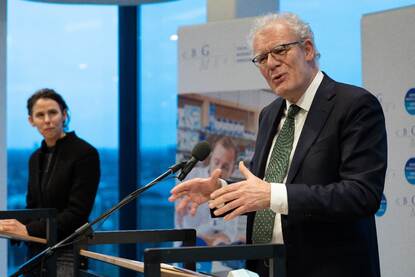Organisation
As an independent administrative body, the MEB wants to take decisions in a substantiated and transparent manner. That is why the MEB provides an opportunity, in relation to decisions, for an opinion to be submitted and for a hearing. It is also possible to object to a decision by the MEB and then to lodge a legal appeal.
Transparency, independence and integrity
Independence demands integrity. To ensure this the MEB has a Code of Conduct and an integrity policy. Board members, MEB employees and external experts fill in a ‘Conflict of Interest Declaration’. This takes place when employment commences or when entering into a contract, and then annually. New interests must be reported in the interim.
Based on the Code of Conduct and the integrity policy, in 2021, the MEB Agency’s Policy, Regulatory and International Affairs Unit (PRI) frequently issued advice about reported interests, ancillary activities and participation in events, seminars and collaborations. Some interests and activities are deemed to be incompatible with activities carried out for the MEB; other interests can lead to limitations being set for a Board Member or employee. These limitations mean that he or she may not be involved in certain activities, or can only be involved to a limited extent.
Objection and appeal procedures
In 2021, there were 32 different objection and appeal procedures. These procedures could be divided roughly into two main categories. Procedures in which decisions to grant or refuse a marketing authorisation were contested, and procedures about decisions to disclose information under the Public Access to Government Information Act (Wet openbaarheid bestuur, WOB). Competition interests of pharmaceutical companies play an important role in both types of procedures.
Objection and appeal procedures
Freedom of Information Act requests
The MEB received 52 requests under the Public Access to Government Information Act in 2021. In most cases, WOB requests are made by or on behalf of a competing pharmaceutical company. The vast majority of requests concerned ongoing applications for marketing authorisation at the MEB. The MEB also received more extensive requests, in which documents such as assessment reports were requested.
A new development in 2021 was a number of extensive WOB requests for documents relating to the COVID-19 vaccines. Documents that have been made available to the MEB often contain confidential information. This includes personal data or confidential commercial information. This confidential information has to be removed from the documents before these can be provided to the party who requested this information.
As a result of a change in the mandate in December 2019, the MEB agency has also handled WOB requests about veterinary medicinal products since 2020. We do this on behalf of the Minister of Agriculture, Nature and Food Quality.
Freedom of Information Act requests
Opinion procedure
Before the MEB takes a decision on an application for a marketing authorisation, companies that have an interest in the matter (such as the requesting party) must have had the opportunity to give their opinion. In 2021, 15 companies made use of this opportunity. Of these 15 opinions, a hearing was organised at the request of a company in 8 cases. In the other cases, the opinion was submitted in writing. Due to the coronavirus pandemic, all hearings were conducted online via a video link rather than physically at the MEB office.
Hearings and opinion procedures
Quality management
The MEB has been ISO-9001 certified since 2006. With this certificate, the MEB demonstrates that it meets this international quality management standard for the execution of its statutory tasks.
For the statutory tasks with regard to pharmacovigilance, the MEB is obliged to have a quality system in place by virtue of European regulations. Although the regulation does not actually specify that external certification is obligatory, the MEB considers it important to operate in a transparent and, where possible, verifiable manner. This promotes confidence. External certification provides additional assurance. The audit certification of 2021 shows that the MEB still meets the standard.
Complaints
A total of 20 complaints were received from external parties in 2021. Of these, 9 were well-founded, 4 were unfounded, 1 was partially founded and 6 were non-admissible. The well-founded complaints mainly concerned exceeding the statutory time limit for marketing authorisation assessments, the handling of WOB requests and exceeding the time limit for responding to questions submitted via the contact form.
After handling the complaint, the cause of each complaint is determined. During the annual complaints analysis, the cause is discussed with the head of the department to which the complaint pertained. The aim of this discussion is to identify trends and take suitable improvement measures to avoid repetition in the future.
Diversity and inclusion
The MEB wants to be an inclusive employer: all employees should feel actively involved and accepted. This ambition is reflected in a diverse range of positions and accessibility for people with a disadvantage on the labour market. The statutory framework for this has been laid down in the Participation Act (Participatiewet) and the Jobs Quota (Work Disabled Persons) Act (Wet banenafspraak en quotum arbeidsbeperkten). In 2021, it was the MEB's aim to realise in total 14.3 FTEs in jobs for people with a disadvantage on the labour market. This number was successfully achieved. In order to further lower the threshold for people with a disadvantage on the labour market, the MEB aims to realise 15.5 FTEs in 2022.
The MEB joined the Ministry of Health, Welfare and Sports’ Working Group for Diversity and Inclusion in 2020. The MEB is placing a greater internal focus on diversity and inclusion and raising awareness by organising activities and sharing watching and listening tips.
Facts and figures
The MEB had an average of 421 employees in 2021, together accounting for an average of 387 FTEs. Nearly two-thirds of the MEB employees (65.4%) in 2021 were female, compared to 34.6% male. The average MEB employee is 44.4 years old, works with a part-time factor of 90.6% and has been in MEB's employment for 8.5 years.
On 31 December 2021, the MEB had 428 employees (395 FTEs).
Sickness absence in 2021 was 4.1%. This was an increase compared to the previous year.
Organisational development
For the MEB Agency, the focus is on optimal performance of its statutory tasks; the assessment of medicinal products and vaccines to determine whether they can be marketed, monitoring adverse reactions and risks, and encouraging proper use of medicines. In addition, the MEB Agency adds value to the national and international chain of organisations involved in the authorisation of medicinal products. This can be done by offering patients reliable, clear and easy-to-read information to encourage correct use of medicines, or by improving the notification centre for shortages for all stakeholders. We also participate in international initiatives to facilitate our work, for example by developing a medicine information database, for medicinal products for human use as well as veterinary medicinal products.
The performance of key tasks has come under pressure in recent years. On the one hand, this pressure is caused by growth of the organisation, complexity of procedures and an increase in activities besides the legal tasks, and on the other hand by pressure on the system of regulating medicines, technological developments and questions from society. Without letting go of our connection to the organisations around us, we had to focus on improving our own organisation in order to be well-equipped to perform our tasks now and in the future.
For the future design of the MEB Agency, the Board opted for a model with three divisions into which the units are grouped. The three division managers and one managing director together form the senior management team. Drafting of the Organisation and Staffing Report for the senior management structure started at the end of 2021. This will be completed in 2022. The further structuring of the remaining organisation will follow.
Employee representation
The composition of the Works Council changed in 2021 as two Council members were no longer able to combine their Council membership with their normal activities. Following an interim election, the Council continued with the maximum number of nine members.
The retirement of the Director meant that a new Director was appointed. The Council issued a recommendation on this appointment as described in Article 30 of the Works Councils Act (Wet op de ondernemingsraden, WOR). The Council also agreed to look for a new business operations manager. This decision was reached in anticipation of the reorganisation in order to address vulnerabilities in the senior management structure.
The COVID-19 pandemic once again generated more work for the MEB in 2021. This included adapted working methods due to accelerated procedures. Staff were also directly and indirectly impacted by COVID-19. The result was a considerable increase in sickness absence. The combination of more work and more absenteeism led to a consistently high workload within the organisation. A number of actions were implemented in 2021 aimed at reducing the workload, however the effect of such measures can only be felt over time.
Workload and absenteeism were important topics for the Works Council. We also drew attention to staff well-being and the impact of COVID-19 measures on job satisfaction. Other topics on the Council’s agenda in 2021 were the organisational development process (including the reorganisation of the senior management structure), the perception of social safety within the organisation and the upcoming relocation.
Information provision
The central theme of this annual report, ‘Looking forward’, also applies to the MEB’s Information Provision Unit (IPU). In a number of areas, the foundations have been laid behind the scenes for plans that will bear fruit in the years to come.
Alongside normal activities, the COVID-19 pandemic also had an impact on the work. The digital workplace has been adapted to better suit the large amount of time spent working from home, colleagues were given access to new information provision resources, and faults were eliminated from the system as much as possible.
Outsourcing ICT infrastructure
The start of 2021 saw the completion of the extensive migration of the MEB’s ICT infrastructure to a government data centre and the transition to the new ICT services provider Solvinity. The rest of 2021 was all about fine-tuning this service provision. This is the first step in a long-term plan to level up the MEB’s information provision service and to allow the unit to grow into a demand-supply organisation. Preparations for the replacement of the organisation's case management system also started in 2021.
Information security and privacy
Information security is becoming increasingly important. This was demonstrated at global level by multiple successful hacks of companies and institutions. One of the reasons behind the hacks was the Log4j vulnerability. The MEB is affiliated with the central government National Cyber Security Centre (NCSC). Reported threats have increased in both severity and number.
The threat is therefore growing, however protective measures have proven their worth in 2021. The MEB has worked to structurally improve digital resilience. The previously mentioned transition to Solvinity has also contributed positively to this.
New Veterinary Medicinal Products Regulation
The introduction of the new Veterinary Medicinal Products Regulation also generated a lot of work within the Information Provision Unit in terms of European data exchange. One of its tasks was to establish connections between various new databases for the veterinary medicinal products authorised in Europe, such as the European Union Product Database (UPD). Member states must ensure that all information about veterinary medicinal products is available in this database.
All in all, the MEB’s Information Provision Unit therefore made progress in a wide range of areas in 2021. This included improving and levelling up digital services and resilience.








